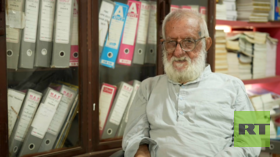100-year-old freedom fighter lauds India’s ‘festival of democracy’

Centenarian freedom fighter G G Parikh, who was jailed for 10 months during the Quit India movement against British rule in India and arrested for his activism during the Emergency period under Indira Gandhi’s regime, spoke to RT about the country’s recently concluded election.
The freedom fighter shared his views on the vote, which has been dubbed the “biggest festival of democracy” by Prime Minister Narendra Modi. Around 970 million people were eligible to take part, the highest in the country’s history.
“Almost all over the world, there was a feeling that a country like India, which has so many languages, so many castes, so [much] diversity, will never be able to conduct a successful election. But as it happens, it happened,” he said.
The Indian Constitution, the centenarian noted, gave everybody the right to vote, including women, without people having to “fight” for this right. Every person who is a citizen of India and who is 18 years of age, is entitled to vote in the country’s elections.
Wheelchair-bound G G Parikh exercised his franchise in Mumbai, which went to polls in the fifth out of seven phases. The final phase was held on June 1, and the results are to be announced on Tuesday.
Although India’s election commission arranged home voting for senior citizens, a wheelchair-bound Parikh volunteered to cast his ballot at the polling station. Parikh, who fought for India’s freedom from British colonial rule, voted in the country’s first parliamentary election conducted in 1951-1952 after India gained independence in 1947.
Parikh was jailed during the ‘Quit India Movement’, demanding an end to British rule, during World War II. The movement, led by the Mahatma Gandhi, comprised a series of mass protests during 1942–43 against the colonial Britain’s political and military control of India.
“The British had oppressed us, looted us, many things they had one, but we did not become anti-British. We became anti-British imperialism,” he told RT.
Even as a youngster, he decided he was ready to die to achieve freedom. “When I went to jail, I felt that I had gone where I should be,” Parikh said. He was again imprisoned for 18 months for his activism during the Emergency from 1975-77 called by then-prime minister Indira Gandhi due to “internal disturbances.”
Indian voters, according to Parikh, have to be encouraged to think about ”issues”, “ideology”, and “values”, instead of “individual pace.” He insisted that India must not copy Europe and, instead, develop in its “own way.”
Where India Meets Russia: Follow and share RT India on X and Instagram













